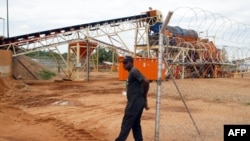LONDON (Reuters) - Caledonia Mining plans to buy gold assets in Zimbabwe and increase its stake in the Blanket mine after the removal of the country’s tough ownership rules.
Keen to attract investment to revitalise the country’s struggling mining industry and economy, Zimbabwe has revised its laws since the departure of former President Robert Mugabe to allow foreign firms to fully own operations, with the exception of diamond and platinum mines.
Previously mines had to be 51 percent owned by Zimbabweans.
Caledonia, which operates the Blanket mine in southern Zimbabwe, has been encouraged by its investors to look at expanding in Zimbabwe for the first time in years, head of corporate development Maurice Mason told Reuters.
At the end of December Caledonia had a cash balance of $12.8 million.
Mason said it was ready to tap equity markets for cash for larger deals, but in the meantime the company will focus on low-cost acquisitions. It plans to target mines that had previously been forced to shut because of a lack of investment.
“There were many mines that closed because the operating environment was too tough,” Mason said, adding that Caledonia was evaluating a few mines.
“With (new) capital they could produce far more gold.”
One stumbling block to M&A activity in Zimbabwe was the valuation gap between buyers and sellers, Mason said.
London-listed Caledonia is also investing $4 million over the next 18 months to explore the area around Blanket in an effort to boost output to about 80,000 ounces a year by 2021, from 56,000 ounces last year.
Zimbabwe is emerging as the “last frontier for gold mining in Africa”, Mason said.
Gold output is falling in neighboring South Africa because of soaring costs while Tanzania’s top gold producer, Acacia Mining, has also cut production after a row with government over taxes.
Caledonia will probably increase its 49 percent stake in Blanket mine by buying the government’s 16 percent stake, Mason said.
The company is not alone in seeing new opportunities in Zimbabwe. A Cypriot investor signed a $4.2 billion deal in March to develop a platinum mine and refinery in Zimbabwe, which President Emmerson Mnangagwa said showed the country was “open for business”.
Analysts, however, have cautioned against the perception that investors are ready to flood Zimbabwe with capital, citing the short time the new government has been in power as well as concerns over foreign exchange restrictions.




